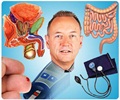A promising new approach to treating colorectal cancer was discovered by scientists and surgeons at Princess Margaret Cancer Centre.

He talks about the research in this video - click the link to watch: https://www.youtube.com/watch?v=QK7JquljkBc.
Dr. Dick pioneered the cancer stem cell field by first identifying leukemia stem cells (1994) and colon cancer stem cells (2007). He is also renowned for isolating a human blood stem cell in its purest form – as a single stem cell capable of regenerating the entire blood system – paving the way for clinical use (2011). Dr. Dick holds a Canada Research Chair in Stem Cell Biology and is a Senior Scientist at University Health Network's Princess Margaret Cancer Centre and McEwen Centre for Regenerative Medicine. He is also a Professor in the Department of Molecular Genetics, University of Toronto, and Director of the Cancer Stem Cell Program at the Ontario Institute for Cancer Research.
In pre-clinical experiments, the research team replicated human colon cancer in mice to determine if specifically targeting the stem cells was clinically relevant. First, the researchers identified that the gene BMI-1, already implicated in maintaining stem cells in other cancers, is the pivotal regulator of colon cancer stem cells and drives the cycle of self-renewal, proliferation and cell survival. Next, the team used an existing small-molecule inhibitor to successfully block BMI-1, thus demonstrating the clinical relevance of this approach.
Lead author Dr. Antonija Kreso writes: "Inhibiting a recognized regulator of self-renewal is an effective approach to control tumor growth, providing strong evidence for the clinical relevance of self-renewal as a biological process for therapeutic targeting."
Dr. Dick explains: "When we blocked the BMI-1 pathway, the stem cells were unable to self-renew, which resulted in long-term and irreversible impairment of tumour growth. In other words, the cancer was permanently shut down."
Source-Eurekalert
 MEDINDIA
MEDINDIA



 Email
Email










